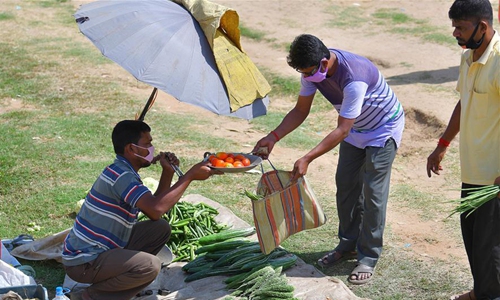WORLD / CENTRAL & SOUTH ASIA
Experts warn India could become next COVID-19 hotspot

People buy vegetables during the lockdown due to the COVID-19 outbreak in the outskirts of Agartala, India's northeast state of Tripura, March 30, 2020. Photo: Xinhua
Chinese experts are concerned that India might be the next COVID-19 hotspot as the country is seeing an increasing risk of mass infection and faces challenges in conducting widespread testing in rural areas with limited medical resources to address the potential outbreak across the country.
India reported more than 4,700 COVID-19 cases on Tuesday, with over 350 new infections confirmed in one day, according to the Ministry of Health and Family Welfare of India. Among them, nearly 30 percent have been linked to a big Islamic religious gathering in New Delhi in early March, which marked the largest cluster infection in the country so far.
According to Indian media, about 3,500 people from around India and abroad attended the two-day annual meeting of the religious group in Nizamuddin, a section of New Delhi, on March 13 and nearly 2,000 people spent several days in the area afterwards, the Guardian reported on April 1.
The government began to track down the people after the attendees returned to various states. Over 9,000 people had been quarantined as of April 3.
Chinese experts have warned that if the Indian government cannot identify and control all the potential virus carriers from the gathering and their close contacts, Nizamuddin could become an Indian version of Daegu, a city in South Korea where a religious congregation caused a clustered infection among attendees in mid-February, and led to a further virus spread across South Korea.
The screening of virus carriers, including asymptomatic patients, needs to be done through large-scale nucleic acid testing within a short time, which requires a high testing capacity that only India's big cities have but remains quite challenging in its rural areas, experts said.
"Limited testing facilities and lack of medical resources in rural areas are major challenges for the country's anti-pandemic work, especially when around a half million migrant workers in the city are returning to their hometown amid the country's lockdown," said an expert on India, Qian Feng, a senior fellow with the Taihe Institute and director of the research department of the National Strategy Institute at Tsinghua University, on Tuesday.
The government announced a 21-day lockdown on March 24 after the country's virus infection changed from imported cases to local clustered transmission.
A reported case in the slums in Mumbai also raised concerns about the potential spread of the virus among residents in a community with a population of over 700,000 that lacks clean water and has a poor sanitation system.
Communities in such environments need extra and urgent attention from the government as there are many factors that can result in an outbreak, Yang Zhanqiu, a Wuhan-based virologist, told the Global Times on Tuesday.
Though the country has updated its medical systems from its past experiences in combating epidemics, such as the pneumonic plague in 1994, hospital capacity remains limited to handle large-scale treatment of severe and mild patients if an infection explosion happens.
Shruti Rajagopalan, a researcher at George Mason University in the United States, estimated that the average number of hospital beds per 1,000 people in India is 1.31, which is much lower than 2.8 in the US, 2.9 in the UK, and 3.4 in Italy, according to the World Bank.
"If the pandemic situation keeps worsening rapidly, a potential breakdown of the medical and health system might cause the country to become the next COVID-19 hotspot," Qian warned, calling for the world's attention to be given to India and China's help to provide guidance on prevention and control as it has flattened the curve.


